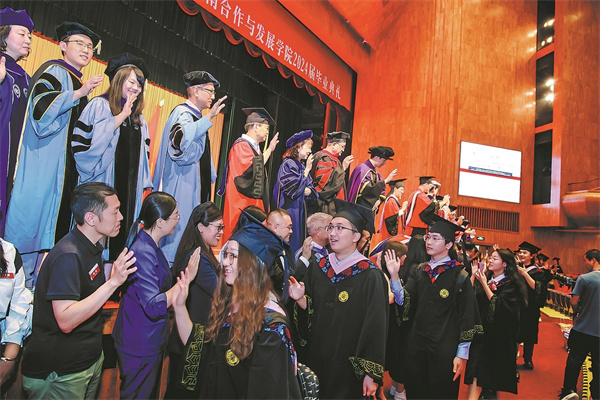Nation helping solve puzzle of global modernization

Students pay respects to their teachers during the commencement ceremony of the Institute of South-South Cooperation and Development at Peking University in Beijing on June 22. [Photo provided to China Daily]
Long-term governance
The success of China's development has led people around the world to study the CPC's long-term governance in China, and how it leads the country to achieve continuous prosperity.
Tulu visited various organizations in China, including the Party school, and interacted with CPC leadership at various levels. He said he found that preserving unity and direction in China requires strong leadership. Tulu added that the Chinese leadership thinks long-term and plans strategically.
"The CPC considers centuries and decades in its thinking. They place a strong emphasis on stability and sustainable development, looking beyond immediate profits," Tulu said.
China's development is guided by Five-Year Plans for specific time periods. They implement the CPC's governance concept, define clear goals, and divide long-term objectives into manageable short-term assignments, he said.
For example, goals for socialist modernization by 2035 were made alongside the 14th Five-Year Plan (2021-25), which also offered recommendations for the next five years, he said. "They illustrate the CPC's capacity to uphold popular will and mobilize support by combining goal and problem-oriented approaches," he said.
Tulu also learned that merit-based promotions are highly valued by the CPC, which helps guarantee competent leadership that can adjust to shifting conditions.
Party discipline is the third critical component of success and entails campaigns against corruption, procedures for holding people accountable, and ongoing assessments, he said.
Reaching out to the public through initiatives like the "mass line" strategy is the fourth aspect, Tulu said. "This motivates public servants to pay attention to citizens' worries, meet their needs, and preserve support from the public," he said.

Follow us on WeChat
京ICP备18041594号-1
京公网安备 11010202005508号

Follow us on WeChat


